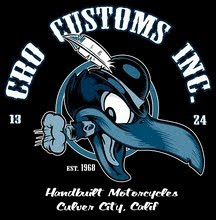Chris has owned this 1977 T140 for the best part of 10 years, and never really been enamoured with it.
More used to riding big singles he expects the motor to pull from a lot fewer revs than the T140 motor is happy with. Anybody who's ridden one must agree that they are much more lively in the upper reaches of the rev band, this is a result of Triumph's strange choice of cams, there's a few explanations on the interweb, but this is the best explanation HERE if that's what John Healy reckons, it's more than good enough for me.
The motor came apart at the start of autumn to be looked at, and by and large things were not bad, but it's a low mileage bike.
The crank was checked and the sludge trap thoroughly cleaned. The assembly, along with an equal pair of pistons were taken to Basset Down Balancing to be spun up and balanced to 74%. This really is a must do on a Triumph, once you have your crank in your hands!! The result is phenomenal, they will waffle around on the throttle quite happily afterwards.
A pair of Newman Cams ground to the 650 T120 E3134 profile went in along with "R" followers to put a few hairs on it's chest, and to deserve the name Bonneville. The head received a full and thorough overhaul, valves, guides and springs following a visit to Peter at I Cleenz Macheenz for vapour cleaning along with the rest of the main castings.
The rest of the bike was freshened up with parts that were needed rather than a no expense spared restoration, so what you see is still 90% 1977.
As for whether the engine work was worth it? If you ask Chris, the answer is a resounding yes. It pulls stronger from lower down the rev range and with a smoothness that a lot of people would not associate with a Triumph twin.
It can now, justifiably, be called a Bonneville.


















































-25.jpg)










.jpg)




















































No comments:
Post a Comment